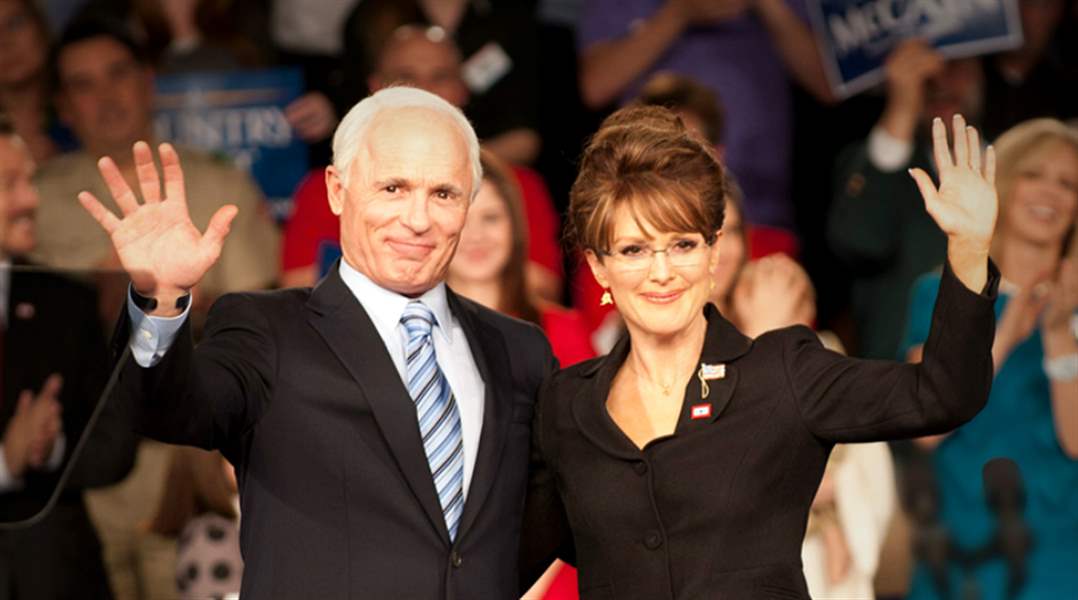
McCain-Palin depicted with jaw-dropping portrayals
3/3/2012
There's no getting around politics in Game Change, HBO's jaw-dropping TV movie depicting the 2008 presidential campaign of U.S. Sen. John McCain.
Actor Ed Harris perfectly apes the Arizona Republican's stiffness, if not his voice quality.
But the film really stars Julianne Moore as Sarah Palin. Moore's take is no jokey Tina Fey spoof; rather, she almost becomes the then-governor of Alaska with imitations of her vocal inflections and mannerisms that are shocking in their accuracy. Swaddle an Emmy statue in bubble wrap and send it to her now because Moore is a shoo-in for the Best Actress in a Movie/Miniseries award.
Made by the same writer/director team of Danny Strong and Jay Roach responsible for the 2008 HBO film Recount about the 2000 election, Game Change (9 p.m. March 10) is another process picture. It's all about how campaigns happen, pulling back the curtain to show maneuvers employed to win voters' hearts. (Appeals to the mind are in short supply.)
If the film tells us anything about electoral politics, it's that political campaigns consist primarily of playing on voters' emotions, and in this particular case that ranges from patriotism to fear. The film's campaign staffers faithfully execute the candidates' campaign strategy, unconcerned with the wisdom of the underlying policy values.
McCain senior campaign strategist Steve Schmidt (Woody Harrelson) frequently plays the old "blame the liberal media" card in TV interviews about Palin's preparedness, but behind closed doors he and other members of the McCain team fully acknowledge that she's out of her depth. Palin mistakenly thinks America invaded Iraq because "Saddam Hussein attacked us on 9/11." She's also confused about why there are two Koreas.
Behind the scenes, senior adviser Nicolle Wallace (Sarah Paulson, Studio 60 on the Sunset Strip) defends Katie Couric's line of questioning in an interview, blaming the vice-presidential candidate for a bad performance: "You didn't fight back. You just gave up!"
Regardless of the film's backroom illuminations, there's still a basic question: Can a politically charged movie about a polarizing figure such as Sarah Palin have much appeal beyond the Democratic base?
If we're to believe Meghan McCain, the candidate's daughter, it won't matter.
"Oh, Republican voters don't watch HBO," she said in an interview earlier this year on MSNBC. "Are you kidding? They don't care."
Meghan McCain also said she did not like the book Game Change, by Mark Halperin and John Heilemann, which is the basis of the HBO film. But the movie depicts her father quite sympathetically. And his advisers, though they make some huge mistakes -- most notably in failing to fully vet Palin before recommending her for the veep slot -- also come across as devoted patriots who grow terrified of the Pandora's box they might have opened with Palin's nomination.
On election night when Palin wants to deliver her own concession speech, something vice-presidential candidates don't do, Schmidt attempts to rein her in, saying, "It's not about you, it's about the country. ... You, Sarah Palin, will not change the importance of this proud, American tradition."
Filled with pulse-pounding, thriller-style music, Game Change is a thoroughly engrossing film made all the more compelling by Moore's performance. She nails Palin's trademark accent and speaking cadence. Moore's Palin veers from a near-catatonic state after too much bad press to impossibly demanding in the last month of the campaign when her head swells with self-importance following a not-disastrous debate performance.
Moore's Palin is not a villain so much as a politician adept at playing to Alaska's pint-sized stage but completely unprepared for a national spotlight. Her self-confidence masks a lack of knowledge. She's surprisingly clueless about world geography, let alone foreign policy, and overly concerned with her standing back home in Alaska, insisting on filling out a questionnaire for a Wasilla newspaper when she should be prepping for the Couric interview.
While Game Change, the book, follows both the McCain and Obama campaigns, the HBO film only follows the McCain-Palin ticket, with actors playing all the Republican characters interspersed with real archival footage of then-Sen. Barack Obama of Illinois. In addition, the book covered the full campaign; the movie covers just the last 100 pages of the 450-page book after Palin joined the ticket.
Although Game Change is based on a nonfiction account of the 2008 presidential race (much of what's included in the film has been reported previously, based on interviews with sources inside the McCain campaign), the film itself undoubtedly has some dramatized moments. A scene near the end suggests Wallace was so appalled by the prospect of Palin being one heartbeat away from the presidency that she chose not to vote on Election Day. Maybe that's true, maybe it's not, but such a confession is absent from 2010's hardcover edition of the Game Change book.
Fans of Palin likely will dismiss the film outright; her detractors who watch will salivate over her every misstep. But if viewers put politics aside, imagining everyone on screen as a character rather than a stand-in for a real-life figure, they will find that Game Change offers enough Shakespearean machinations to warrant praise as an exceptional melodrama.
The Block News Alliance consists of The Blade and the Pittsburgh Post-Gazette. Rob Owen is a staff writer for the Post-Gazette. Follow him on Twitter: @RobOwenTV.